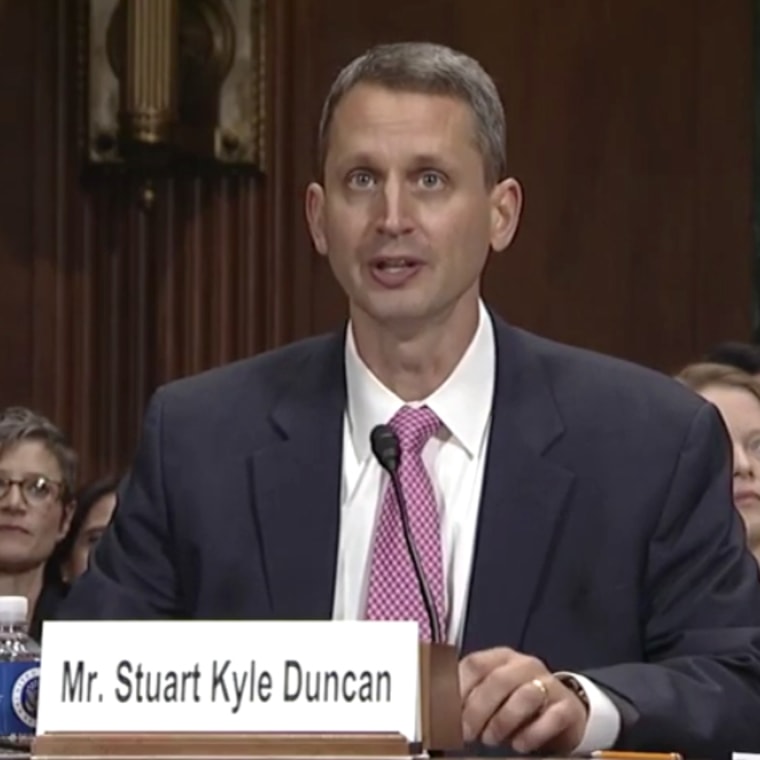Stuart Kyle Duncan, a judge on the 5th U.S. Circuit Court of Appeals, issued an advisory opinion Wednesday that dismissed a transgender defendant's chosen pronouns and the broader concept of gender identity, just less than two years after LGBTQ advocates warned that Duncan would not rule fairly if confirmed to the bench.

Kathrine Nicole Jett, a transgender woman who was known as Norman Varner when she pleaded guilty in 2012 to attempted receipt of child pornography, moved to have her conviction records updated to match her changed name, according to the decision. A lower court judge dismissed her motion because there was no "defect" in the original judgment paperwork, in that "Norman Varner" was her legal name when the documents were produced.
Jett's appeal appeared before the 5th Circuit, where Duncan sits. In his majority opinion, Duncan vacated the lower court ruling that denied Jett's appeal, saying the court lacked jurisdiction, but then he proceeded to mock Jett's court motion that she be referred to using female pronouns and her new name.
Duncan refers to Jett only using "he" pronouns throughout and refers to her as a "gender-dysphoric" person, instead of as a transgender person.
"Federal courts sometimes choose to refer to gender-dysphoric parties by their preferred pronouns," Duncan wrote, and "our court has gone both ways."
In fact, the 5th Circuit has broadly respected the identities of transgender defendants for at least four decades. In 1980, the 5th Circuit wrote in Rush v. Parham that it would follow the "convention" in "medical literature" of referring to transgender people using their preferred pronouns.
In his argument against using Jett's pronouns and name, Duncan cites eight cases from 1980 to 2014 in which the 5th Circuit referred to transgender people using their correct pronouns. He cites three cases in which the 5th Circuit did not, including edge cases, such as one in which a prisoner who once identified as a gay man had later come out as a transgender women.
"Congress has said nothing to prohibit courts from referring to litigants according to their biological sex, rather than according to their subjective gender identity," Duncan correctly observes, noting that the "convention" is and continues to be a "courtesy."
Duncan goes on to warn that respecting a transgender person's gender in the same way courts respect a cisgender person's gender "may unintentionally convey its tacit approval of the litigant's underlying legal position." He warns that respecting transgender people's gender identities "may well turn out to be more complex than at first it might appear" because of a "galaxy" of genders, citing what he says is a "widely circulated" University of Wisconsin LGBTQ+ Resource Center guide to pronouns. (A Google reverse image search of the pronoun guide included in Duncan's opinions returned no matches.)
Before his confirmation, LGBTQ advocates like Lambda Legal and Congressional Democrats decried Duncan's nomination, saying he could not be trusted to rule fairly in cases regarding the LGBTQ community.
Indeed, Duncan was part of the legal team that represented the Gloucester County, Virginia, School Board in its case against Gavin Grimm, a transgender high school student who was unable to use the restroom that aligned with his gender identity.
"The idea that Mr. Duncan will cast aside his bigoted beliefs overnight, and miraculously transform into an impartial judge, is ludicrous and reckless," Lambda Legal Executive Director Rachel Tiven said in 2018, before Duncan was confirmed.
Chase Strangio, a transgender advocate who is a staff attorney for the ACLU, said Duncan's opinion Wednesday was "far outside the standard practice within the entire legal profession."
Strangio said Duncan went "on this long advisory opinion about the legal implications of pronouns and the nature of sex discrimination and things that have nothing to do with the case or the question before it."
"At this point, if the court lets this stand without, on its own, amending the opinion or rescinding it, then it ultimately makes the court look like a political body rather than a legal one," Strangio said, adding that he thinks the 5th Circuit could vacate the opinion — "even just for the reason that this is just an extensive advisory opinion on all sorts of questions not before the court, which is way outside the bounds of what federal courts generally do."
Judge James L. Dennis, whom President Bill Clinton appointed to the 5th Circuit Court, filed a blistering dissent that questioned Duncan's authority to issue an "advisory opinion" — a judicial ruling addressing an issue not brought up before the court — and said "it is not necessary to use any pronoun" in adjudicating the appeal.
"As the majority notes, though no law compels granting or denying such a request, many courts and judges adhere to such requests out of respect for the litigant's dignity," Dennis wrote.
Dennis cites nine cases from 1993 to 2018 in which federal courts referred to transgender people by their gender identity.
"Ultimately, the majority creates a controversy where there is none," Dennis wrote. "The majority then issues an advisory opinion on the way it would answer the hypothetical questions that only it has raised."
"Such an advisory opinion is inappropriate, unnecessary, and beyond the purview of federal courts," Dennis wrote, citing a precedential federal court ruling that stated "federal courts have never been empowered to issue advisory opinions."
"The majority's lengthy opinion is dictum and not binding precedent in this court," Dennis wrote. "For these reasons, I respectfully but emphatically dissent."
Follow NBC Out on Twitter, Facebook & Instagram
CORRECTION (Jan. 16, 2020, 10:35 p.m. ET): A previous version of this article misspelled the first name of the person who brought the motion; she is Kathrine Nicole Jett, not Katherine Nicole Jett. The article also misstated when Jett pleaded guilty to attempted receipt of child pornography; it was 2012, not 2001. And it misstated the state where the most recent lower court appeal in her case was heard; it was in Texas, not Kentucky.



